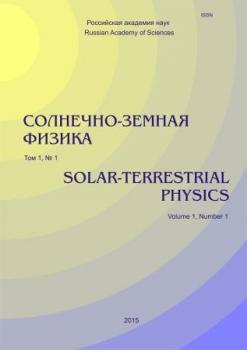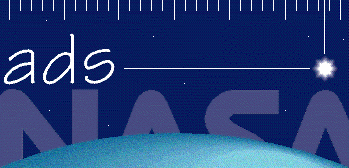from 01.01.1991 to 01.01.2022
Apatity, Murmansk, Russian Federation
Apatity, Russian Federation
UDC 55
We have studied the influence of the precipitating electron spectrum shape on the integral intensity of emissions λ391.4 nm 1NG N⁺₂, λ670.4 mn 1PG N₂, λ337.1 nm 2PG N₂, λ320.0 nm VK N₂, λ127.3 nm LBH N₂, atomic oxygen emissions λ557.7 and λ630.0 nm, total electron content in the vertical column of aurora. The integral characteristics of the emission intensity and the total electron content are shown to weakly depend on the energy spectrum shape and to be determined mainly by average energy values Eev and energy flux value Fᴇ of precipitating electrons. An algorithm is proposed for diagnosing the planetary distribution of emission intensities and total electron content in auroras based on data from empirical electron precipitation models, without making a priori assumptions about the shape of the energy spectrum of precipitating electrons.
auroras, electron precipitation, excitation efficiency, auroral emissions, electron density, planetary distribution
1. Dashkevich Zh.V., Ivanov V.E., Sergienko T.I., Kozelov B.V. Physicochemical model of the auroral ionosphere.Cosmic Res. 2017, vol. 55, pp. 88-100. DOI:https://doi.org/10.1134/S0010952517020022.
2. Dashkevich Zh.V., Ivanov V.E. The evaluation of efficiency O(1S) and O(1D) excitation mechanisms in aurora. Trudy Kolskogo nauchnogo tsentra RAN [Proc. Kola Scientific Center of the Russian Academy of Sciences]. 2018, vol. 5, pp. 69-75. (In Russian).
3. Ivanov V.E., Kozelov B.V. Prokhozhdenie elektronnykh i protonno-vodorodnykh puchkov v atmosphere Zemli [Transmission of electron and proton-hydrogen beams through Earth atmosphere]. Kola Scientific Center; Polar Geophysical Institute.Apatity, Kola Scientific Center Publ., 2001. 260 c.
4. Ivanov V.E., Kirillov A.S., Malkov M.V., Sergienko T.I., Starkov G.V. Boundaries of the aurora oval and the planetary model of the glow intensity. Geomagnetizm i aeronomiya. [Geomagnetism and Aeronomy]. 1993, vol. 33, pp. 80-88. (In Russian).
5. Hardy D.A., Gussenhoven M.S., Holeman E. A statictical model of the auroral electron precipitation. J. Geophys. Res. 1985, vol. 90, pp. 4229-4248.
6. Hardy D.A., Gussenhoven M.S., Raistrick R., McNeil W.J. Statistical and functional representations of the pattern of auroral energy flux, number flux, and conductivity. J. Geophys. Res. 1987, vol. 92, pp. 12275-12294.
7. Hedin A.E. Extension of the MSIS thermosphere model into the middle and lower atmosphere. J.Geophys. Res. 1991, vol. 96, pp. 1159-1172.
8. Sergienko T.I., Ivanov V.E. A new approach to calculate the excitation of atmospheric gases by auroral electron impact. Ann. Geophys. 1993, vol. 11, no. 8, pp.717-727.
9. Spiro R.V., Reiff P.H., Maher L.J.Jr. Precipitating electron energy flux and auroral zone conductance - an empirical model. J. Geophys. Res. 1982, vol. 87, pp. 8215-8227.
10. Vorobyov V.G., Kirillov A.S., Katkalov Yu.V., Yagodkina O.I. Planetary distribution of the auroral glow intensity obtained using the auroral precipitation model. Geomagnetism and Aeronomy. 2013, vol. 53, pp. 711-715. DOI:https://doi.org/10.1134/S0016793213060169.
11. Vorobyov V.G., Yagodkina O.I. Influence of magnetic activity on the global distribution of auroral intrusion zones. Geomagnetizm i aeronomiya [Geomagnetism and Aeronomy]. 2005, vol. 45, pp. 467-473. (In Russian).
12. Vorobyov V.G., Yagodkina O.I. Dynamics of auroral precipitation during strong magnetic storms. Geomagnetizm i aeronomiya [Geomagnetism and Aeronomy]. 2007, vol. 47, pp. 198-205. (In Russian).
13. Vorobjev V.G., Yagodkina O.I., Katkalov Yu.V. Auroral precipitation model and its applications to ionospheric and magnetospheric studies. J. Atmos. Solar-Terr. Phys. 2013, vol. 102, pp. 157-171. DOI:https://doi.org/10.1016/j.jastp.2013.05.007.
14. URL: https://ccmc.gsfc.nasa.gov/modelweb/models/msis_vitmo.php (accessed January 23, 2022).


















